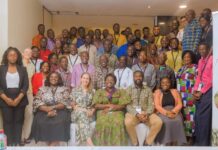Africa must feed itself so that it restores its dignity and pride in food production and becomes self-sufficient, riding on the strength of research work by its tertiary institutions, President Mnangagwa has said.
He said it is high time that the African continent has high regard for agriculture and get rid of the mind-set of viewing it as a primitive activity that could not be undertaken by educated persons.
The President said this last night when he was officially opening the Regional Universities Forum For Capacity Building annual general meeting that drew academics, researchers from different universities in Africa.
“Drawing from our rich African traditional knowledge systems, linkages between agriculture and nutrition should be enhanced to improve the health and well-being of our people.
The agriculture value chain presents a plethora of opportunities, which the Forum should fully explore. These must see overall increase in agriculture exports from the continent to other parts of the world.
The current Status quo where Africa is a net importer of food is untenable,’ said President Mnangagwa.
“Collectively let us restore African pride and dignity. Our forefathers were highly respected by their own communities.
They lived in dignity despite what they put on. You may dress like a Hollywood star but you have no dignity because you have lost your culture.
“The mind-set that agriculture is for the backward should change, agriculture is for the sophisticated.
The bottom line remains, Africa must feed itself. Agriculture must be made attractive and lucrative sector for our young people to undertake.”
President Mnangagwa said it is critical to note that a larger percentage of the continent’s population resides in rural areas, earning a living from agriculture.
“Increasing production and productivity levels in the sector therefore remains critical for a higher quality of life and improved incomes among grassroots communities.
It is further imperative that we leverage on our abundant arable land, dams and rivers to increase agriculture output,” said President Mnangagwa.
The Forum, he said, should come up with implementable strategies for accelerated agriculture growth and food systems given challenges such as climate change and land degradation.
President Mnangagwa said there is a need for stakeholders to do more in closing glaring gaps between research outcomes, for example with regards to recommended yields per hectare and actual yields realised by farmers.
“Your work as academics and researchers, must translate to high impact research outcomes that impact the actual productivity levels within our agriculture sector.
Research support must be channelled towards priority areas and the advancement of an agenda that promotes sustainable agriculture towards ending hunger and poverty on the continent,’ he said.
“Our institutions of higher learning are called upon to be more responsive and relevant to the needs of our needs of our grassroots communities and respective economics as a whole.
“Undeniably, a properly configured higher education sector is a powerful catalyst for the transformation of our economies, towards knowledge driven economic growth in our African continent.”
President Mnangagwa said his Government has since move away from a restrictive education to one that produces goods and services.
“In the case of Zimbabwe, my Government recognised that the restrictive old system of education which entailed merely writing, reading and arithmetic, was inadequate for the transformation, modernisation and industrialisation and growth of our economy.
“We thus made a conscious decision to transform our education to one which is geared towards production of goods and services using local resources,’ said President Mnangagwa.
He said there is a need to strengthen the resolve to achieve the collective goal for Africa.
“This must be driven by us, African citizens, from Cape to Cairo through deepening our cooperation as well as exploiting our collaborative undertakings and regional synergies, he said.
Vice President Constantino Chiwenga commended President Mnangagwa for his astute leadership saying it is bearing fruit. “He is a man on a mission with a clear vision for a prosperous Zimbabwe,
He said universities had heeded President Mnangagwa’’s call to produce goods and services, something that helped in saving more than US$300 million on the import bill during the Covid-19 pandemic.
Higher and Tertiary Education, Innovation, Science and Technology Development Minister, Professor Amon Murwira, said if properly structured, education must save people from poverty.
“We have many universities in Africa but we have few African universities,” said Prof Murwira. Forum Executive secretary, Professor Adipala Ekwamu commended the Zimbabwean Government for its efforts to turn around the education system in the country.
Food and Agriculture Organisation, Assistant Director, Professor Abebe Haile-Gabriel said there is a need for the African continent to fight poverty and hunger which he said is still prevalent in the continent.
The Forum has more than 150 universities from the continent including eight from Zimbabwe The event was attended by Government Ministers from Africa, Vice Chancellors of universities in Africa, academics, researchers and senior Government officials.








